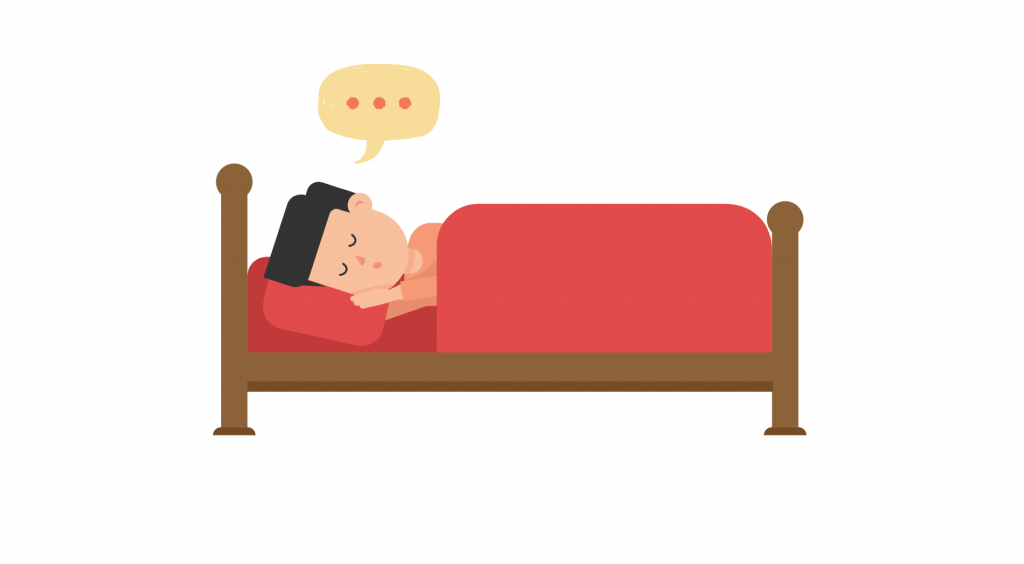Many people experienced sleep talking at least once, but only few people actually experience it on a weekly basis (about 6%). At the moment, it is still not clear why people talk during their sleep. One of the possible causes is genetic or, in other words, it seems to run in the family: twins who share the same genes (monozygotic twins) both experience sleep talking more often than siblings who only share some similar genes (dizygotic twins). We also know that people with mental health conditions are more likely to talk during their sleep: namely, psychiatric disorders are more common in people who sleep talk frequently compared to people with infrequent or no sleep talking. However, most cases of sleep talking are not associated with psychological disorders. Even though sleep talking is defined as abnormal sleep behaviour (also known as parasomnia), it is not considered a medical problem and does not pose any risks. So why do scientists find sleep talking so interesting?
Sleep talking while dreaming?
The phenomenon caught the attention of scientists for two main reasons. First, some scientists are interested in dreaming and what happens in our brains during dreams. However, the only way to study dreams is asking individuals to describe them after waking up. But if sleep talking takes place while people are dreaming, what people say during their sleep could be part of their dream and represent a way to directly access and study the dream content. By comparing the sentences produced during sleep talking and the dream reports (collected after awakening), scientists can check how similar the topics and the words are, in order to understand if the sleep talking episode is part of the reported dream. Scientists found some similarities, so sleep talking seems to reflect, at least partly, dreaming content. However, we only dream during a small part of our total sleep time and sleep talking can happen at any time throughout the night, so it is not the case that a person is always dreaming when they talk during their sleep.
Sleep speech vs awake speech
Another reason that makes sleep talking particularly interesting are the similarities and differences with talking while awake. In fact, both our bodies and our brains change during sleep. During most of our sleeping time, both bodily and brain signals slow down; these include: breathing, heart rate, muscle activity and brain waves. These changes give the body and the brain a period of rest, during which the body recovers and the brain consolidates memories. These changes in brain activity explain why sleep talkers are not aware of talking in their sleep!
Considering that sleep speech and awake speech occur when the body and the brain are in different states, are the cognitive processes that make us speak the same when we are awake and when we are sleeping? Even if most of sleep talking consists of vocalisations, like grunts and mumbles (59%), some sleep speech includes meaningful words that are connected together following grammatical rules. Moreover, it seems that sleep talkers speak in their sleep as if they were having a conversation with another person: they alternate each sentence with a pause, which matches the duration of a sentence. This shows that even when we are sleeping, talking happens in the form of dialogue with another talker and not as a monologue. These results demonstrate that during sleep talking the brain functions similarly to when we are speaking awake.
But there is still one important difference: the cognitive process with which we select the right sounds might be partially blocked or slower during sleeping; this is why most of sleep talking consists of mumbles. This was studied in the brain. Scientists compared the brainwaves of sleeping people during the time before a vocalisation and during the time before sleep speech. The activity of two specific brain waves over the left part of the brain is reduced in the period before sleep speech and this does not happen before vocalisations. This reduced activation is similar to what scientists observe in the brain of people speaking while awake; so, it seems that producing sleep speech and producing awake speech share some cognitive processes, which are different from the processes behind sleep vocalisations.
So, what happens in the brain during sleep talking? Something very similar to what happens during everyday talking, even if there are some important differences! Sleep talking is not dangerous and is a very interesting phenomenon to study: it provides a way to study dreams while people are still asleep and a way to look at how the brain changes during sleep.
Read further:
- Suni, E. (2022, October 7) Sleep talking. Sleep Foundation. https://www.sleepfoundation.org/parasomnias/sleep-talking
- Arnulf, I. et al. (2017). What Does the Sleeping Brain Say? Syntax and Semantics of Sleep Talking in Healthy Subjects and in Parasomnia Patients. SLEEP, 40(11). https://pubmed-ncbi-nlm-nih-gov.ru.idm.oclc.org/29029239/
- Mangiaruga, A. et al. (2022). Sleep talking versus sleep moaning: electrophysiological patterns preceding linguistic vocalisations during sleep. SLEEP, 45(5) https://pubmed-ncbi-nlm-nih-gov.ru.idm.oclc.org/35554596/

